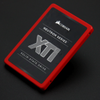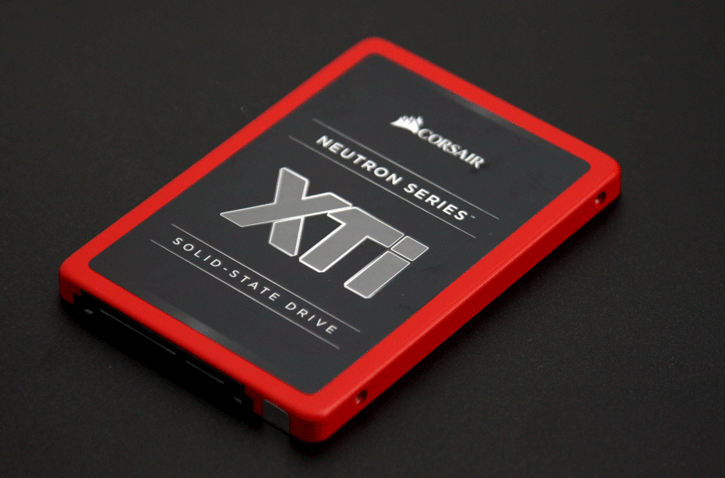Final Words & Conclusion
Final Words & Conclusion
The SATA3 SSD space is so incredibly crowded that it is hard for any manufacturer to make a real difference. Pretty much everybody on that SATA3 interface is close to maxing out the bottleneck it these days is, roughly 560 MB/sec. And that's exactly where the new XTi series sits. It does offer the high-end performance, but so do others. Corsair didn't skimp on production quality. The trend these days is to remove as many components as possible to get prices down, Corsair added components testimony to doubling up that DRAM cache. The choice for MLC NAND over TLC is another example. Then the increased TB written values at 320 TBW and a five year warranty do give us the impression that Corsair offers something very solid here. Before you have written 320 TB on that SSD, you will need to have done some seriously crazy and nasty stuff. Say you plan to use this SSD a good ten years (which in technology land is a LOOOONG time). That means on average you could write 32 TB per year. Divide that by 12 months and multiply it with 1,000 (GB) and you could write 2667 GB per month, which is almost 88 GB per day. And again, I find the 320TB written a rather conservative estimate.
Performance
Overall this SSD shines at many factors and on all levels really, IOPS performance is very good and close to 90~100K. This SSD writes and reads serious amounts of tiny files in a very fast fashion. We stated it before though, IOPS is not something you as a consumer should worry about too much unless you are doing a lot of database related work or create similar workloads on your PC, but this SSD certainly ranks high within this aspect. Trace testing - we think by far the best test in our entire benchmark suite is PCMark Vantage 64-bit. This is a trace test and can emulate what you guys do on your PC but then multiplied by factor 100, this test puts more focus on read performance opposed to writing though. The outcome of the results with the Corsair Neutron XTi are good, not enthusiast class. Sustained read / write performance on the other hand ar again excellent. Zoom in at both IOPS and trace performance and you'll notice that the SSD can manage serious workloads without breaking so much as a drop of sweat. So whether you write lots of small files, copy big MKV movies or do it all together, the Corsair Neutron XTi remains a top notch performer on all fronts.
Overall
Right, an SSD is enjoyable. Very much so. If you put a drive like this into your SATA 3 compatible laptop or SATA 3 compatible PC, you'll have no idea what is about to hit you. We very much enjoy the grand sustained performance of this SSD series. Make no mistake, replacing an HDD with an SSD in your desktop PC or laptop eliminates the random access lag of the HDD head, it is no longer mechanical. That, combined with the performance SATA 3 offers these days, is simply a massive difference and probably the best upgrade you can make for your computer anno 2016.
Controller
Some overall recommendations then. Should you be in the market for a SATA 3 SSD then we have a couple of hints. First and foremost if you have a SATA 2 controller only on your motherboard, then you'll be limited at roughly 270 MB/sec read and writes. SATA 3 (6Gbps) will free you up from that allowing the SSD to perform in the 500 MB/sec range. It is however important that you connect your SSD to the proper controller. We absolutely prefer the performance of the Intel Series 6 and 7 (H67/P67/Z68/Z77/H77/Z87/X79/H97/Z97/X99/H170/Z170) integrated SATA 6G controller over anything else available in the market. If you run the SSD from a 3rd party controller like say, a Marvell 6G controller, you will see lower performance. The new AMD 85X and 900 chipsets also offer fantastic performance. The more recent Asmedia controllers we spotted lately on motherboards also offer good performance, albeit still 20% ~ 25% slower than Intel's controllers. Also make sure you run your drive in AHCI mode, it does make such a difference in performance, a big difference.
Price point
Corsair is able to keep the prices competitive enough, but surely it is hard to beat the Micron / Samsung and Intels out there, especially when you go with MLC NAND over TLC you will pay a bit of a price premium, but in return you do receive a premium SSD right ?
- 480 GB costs € 169 / € 0.35 per GB
A normal price for an enthusiast class performing SSD with excellent endurance and you'll receive a five year carry-in warranty for the XTi models, which we feel is an terrific warranty policy. The prices likely will come down a bit more (IMHO) though once availability is better
Concluding
If you want cheap and relative performance, we can't blame you top go for TLC NAND and say Samsung. We doubt if you'd ever notice the perf difference in a PC compared to a more high-end class product. but the Corsair Neutron XTi series definitely is high-end with a nice increase of DRAM cache, the choice of MLC NAND, that 5 year warranty and 320 TB written guaranteed. I mean surely that is worth the extra 7 cents per GB ? Our test model clearly is very competitive in performance. Concluding, if your workload lines up towards gaming and or high end usage on an game PC, then we have to admit, this is looking to be a great SSD to work with. Not just in terms of performance, Corsair made an SSD that looks good as well, albeit that is subjective as hell of course. Any SATA3 these days however is getting that SATA3 bottleneck (hence I LOVE the new NVMe developments). But if all SATA3 SSDs roughly perform similar, then my advise to you is that you need to focus on quality of NAND, TBW and warranty. Trust me you are not going to notice the difference in-between an SSD reading at 475 MB or 560 MB/sec. It just doesn't work like that as we need many more orders of magnitude for that to become noticeable. With the denominators quality NAND, TBW and warranty combined, you'll hopefully agree with me that Corsair has these big three covered, really well. It's a terrific SSD that comes recommended by Guru3D.com. And though I would really like to see a 1TB unit at 25 cents/GB rather sooner then later though, we totally do understand that quality comes at a slightly increased price. Very much recommended.
Recommended Downloads
- Sign up to receive a notice when we publish a new article
- Or go back to Guru3D's front page


